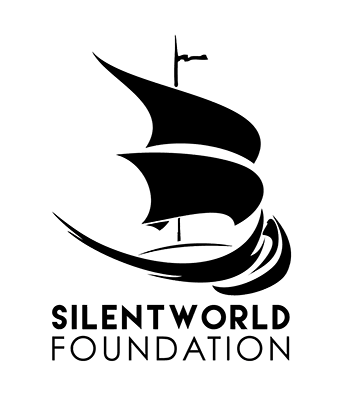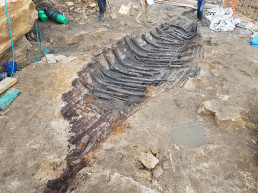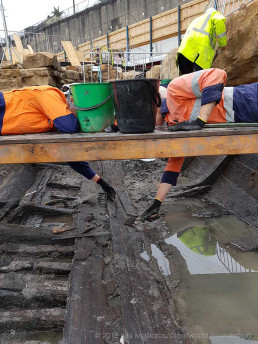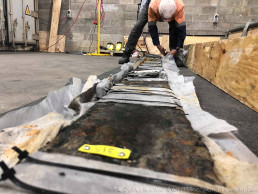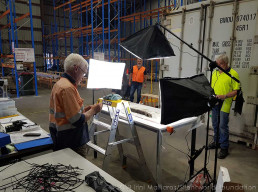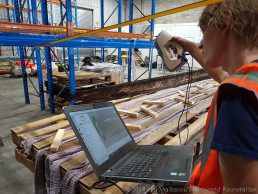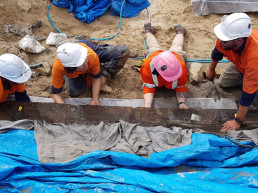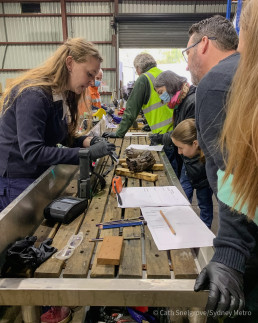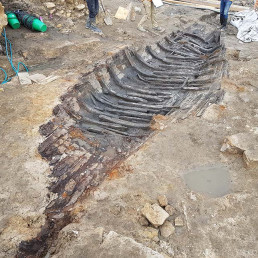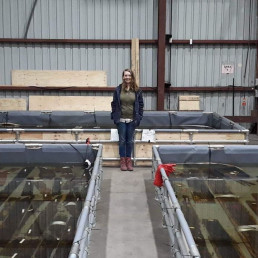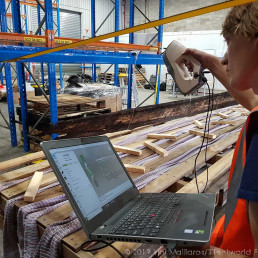MADE IN AUSTRALIA
Our earliest colonial era boat?
The well-preserved remains of a boat were unearthed in November 2018, during Sydney Metro’s excavation of Barangaroo Station, at the historic site of a shipyard. Preliminary timber identification analysis revealed an exclusive use of Australian timber species in the construction of the boat. The type of construction is known as clinker, where the planks are laid first, and slightly overlap each other, and the frames are added later.
The discovery is deemed one of national significance as the boat is believed to be one of the oldest colonial Australian-built craft to be fully excavated, recorded and raised.
The Barangaroo Boat, as it is now known, has the potential to reveal rare information on colonial shipbuilding techniques and the adaptive use of native Australian timber in European construction traditions. Under Sydney Metro planning approval conditions, a rescue excavation was undertaken. See the excavation, hear from the field archaeologists and understand more about the site here.
THE BOAT UNEARTHED
Excavating the Barangaroo Boat
Excavating the Barangaroo Boat
The boat was excavated and painstakingly recorded in-situ. Before being methodically dismantled, positional information of each timber was recorded in the overall structure of the boat. Once each timber had been removed from its resting place, it was individually recorded in more detail. Then the timbers were carefully wrapped to retain moisture, and secured to rigid boards for transportation and storage. This also prevented warping. All timbers were stored in refrigerated containers to slow and prevent biological activity.
As work progressed maritime archaeologists were able to form some preliminary theories about the vessel, drawn from each piece of timber they uncovered. It appears that the builders of the boat were accomplished woodworkers, but idiosyncratic features such as irregular fastening size and materials used, point towards less experienced shipbuilders, or perhaps those with limited sources of materials.
It is exciting to continue exploring the construction, potential use and life of the boat as well as get a rare glimpse into the early life of the colony, as we progress through the conservation phase.
RE-IMMERSING THE BOAT
Recording and conserving the boat hull timers
Recording & Conserving the Timbers
The new phase in the story of the Barangaroo Boat is conservation of all its timbers. In order to undertake this phase, Sydney Metro worked closely with the Silentworld Foundation to develop a detailed project design for the professional documentation and conservation of the boat hull structural elements. The Sydney Metro shipwreck conservation facility was set up to provide a purpose specific platform to undertake this work.
How is it done?
The team must follow a sequence of steps in order to remove the timbers from their cold storage, record them in detail, then prepare them for treatment and finally place the timbers in tanks for conservation.
- Unwrap and clean timber
→ excavated timbers retained sediment on their surface which must be removed as it can harbour bacteria and fungus - Record timber to the highest level possible
→ the team used a structure light scanner to record each cleaned timber to high resolution – the resulting 3D digital models are annotated using CAD software in order to point out specific features - Pretreatment – removing excess iron
→ recorded timbers treated in order to remove excess iron deposited on/in the timbers by the iron nails used in its construction - Treatment – impregnating the timbers with PEG wax
→ polyethylene glycol is a liquid wax – it will replace the water in the cells of waterlogged wood hence providing rigidity when the wood is dried
In this very exciting phase, the Silentworld Foundation and Sydney Metro team are working with York Archaeological Trust and Ubi3D, with collaborative support from the Australian National Maritime Museum. Work on the recording and conservation phase began in October 2019.
FOLLOW THE STORY OF "BROO"
Updates and insights from the news and our team
Read it
On the blog
In the news
Academic articles
- Van Damme, T., Auer, J., Ditta, M. et al.The 3D annotated scans method: a new approach to ship timber recording. Herit Sci8, 75 (2020). View online at: https://doi.org/10.1186/s40494-020-00417-9
Watch it
Sydney Metro reserves the rights to all project imagery. All images and footage have been used with permission from Sydney Metro.
